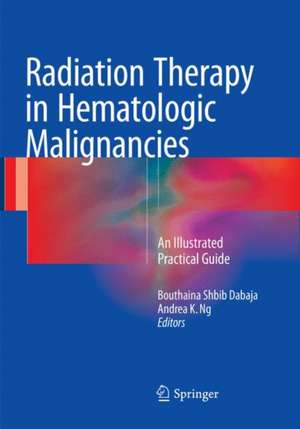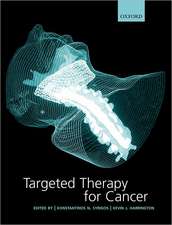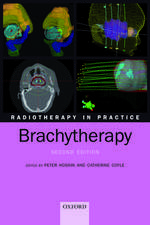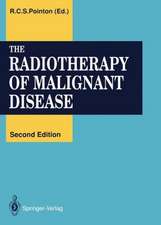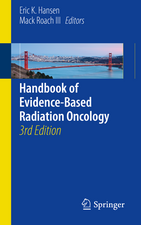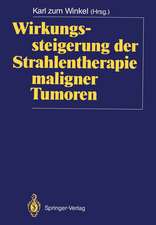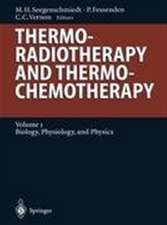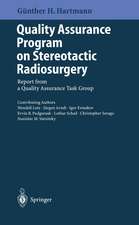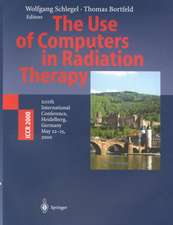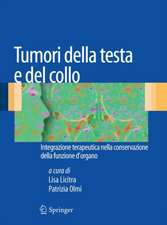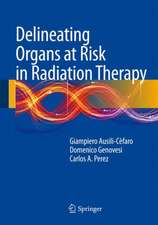Radiation Therapy in Hematologic Malignancies: An Illustrated Practical Guide
Editat de Bouthaina Shbib Dabaja, Andrea K. Ngen Limba Engleză Paperback – 23 iun 2018
| Toate formatele și edițiile | Preț | Express |
|---|---|---|
| Paperback (1) | 645.61 lei 38-44 zile | |
| Springer International Publishing – 23 iun 2018 | 645.61 lei 38-44 zile | |
| Hardback (1) | 1030.27 lei 22-36 zile | |
| Springer International Publishing – 4 noi 2016 | 1030.27 lei 22-36 zile |
Preț: 645.61 lei
Preț vechi: 679.59 lei
-5% Nou
Puncte Express: 968
Preț estimativ în valută:
123.55€ • 128.51$ • 102.00£
123.55€ • 128.51$ • 102.00£
Carte tipărită la comandă
Livrare economică 09-15 aprilie
Preluare comenzi: 021 569.72.76
Specificații
ISBN-13: 9783319826196
ISBN-10: 3319826190
Pagini: 203
Ilustrații: X, 203 p. 124 illus., 102 illus. in color.
Dimensiuni: 178 x 254 mm
Ediția:Softcover reprint of the original 1st ed. 2017
Editura: Springer International Publishing
Colecția Springer
Locul publicării:Cham, Switzerland
ISBN-10: 3319826190
Pagini: 203
Ilustrații: X, 203 p. 124 illus., 102 illus. in color.
Dimensiuni: 178 x 254 mm
Ediția:Softcover reprint of the original 1st ed. 2017
Editura: Springer International Publishing
Colecția Springer
Locul publicării:Cham, Switzerland
Cuprins
Part I: Hodgkin’s Lymphoma: early stage favourable and unfavourable.- Advanced stage.- Primary refractory.- Relapsed Hodgkin’s in the setting of transplant.- Part II: Non Hodgkin’s Lymphoma: Diffuse Large Cell Lymphoma.- Early stage.- Advanced stage.- Refractory/palliative.- Follicular lymphoma: Early stage, grade 1,2.- Advanced stage/palliative.- Extranodal marginal zone: Gastrointestinal origin.- Non-gastrointestinal origin.- Primary mediastinal lymphoma.- Plasmacytoma/multiple myeloma.- Lymphoblastic lymphoma.- Primary CNS lymphoma.- Primary testicular lymphoma.- Mantle cell lymphoma.- Primary skin lymphoma including anaplastic large cell and mycosis fungoides.- Part III: Leukemia: craniospinal irradiation.- treatment of chloromas.
Notă biografică
Bouthaina Dabaja is an Associate Professor in Radiation Oncology, Section chief of Hematologic Malignancies in the department of Radiation Oncology at the University of Texas MD Anderson Cancer Center. Dr. Dabaja received her medical degree from the Lebanese University in Lebanon. She was trained in Internal Medicine and Medical Oncology at the American University of Beirut in Lebanon. Completed her training in Medical Oncology and Radiation Oncology at University of Texas MD Anderson Cancer Center.
Dr. Dabaja is the Section chief of hematologic malignancies in the radiation oncology where she overseas the clinical and research activities and assist in the research development, specifically advancing the application of advanced technology in the treatment of both lymphoma and leukemia. Dr. Dabaja special interest, reflected by her publications in the field, is conducting research in an effort to reintroduce radiation into the treatment of hematologic malignancies with fewer
side effects to maintain its long-term benefit. Andrea Ng is a Professor of Radiation Oncology at Harvard Medical School and Associate Clinical Director of Radiation Oncology at Brigham and Women’s Hospital and Dana-Farber Cancer Institute.
Dr. Ng received her medical degree from Harvard Medical School, Boston, Massachusetts. She was trained in Radiation Oncology (Joint Center for Radiation Therapy, Boston, Massachusetts). Her research work focuses on analyses of treatment outcome as well as short- and long-term effects of radiation therapy in lymphoma patients, optimal follow-up of long-term survivors, and development of novel radiation therapy approaches to limit late effects of treatments while preserving its efficacy.
Dr. Dabaja is the Section chief of hematologic malignancies in the radiation oncology where she overseas the clinical and research activities and assist in the research development, specifically advancing the application of advanced technology in the treatment of both lymphoma and leukemia. Dr. Dabaja special interest, reflected by her publications in the field, is conducting research in an effort to reintroduce radiation into the treatment of hematologic malignancies with fewer
side effects to maintain its long-term benefit. Andrea Ng is a Professor of Radiation Oncology at Harvard Medical School and Associate Clinical Director of Radiation Oncology at Brigham and Women’s Hospital and Dana-Farber Cancer Institute.
Dr. Ng received her medical degree from Harvard Medical School, Boston, Massachusetts. She was trained in Radiation Oncology (Joint Center for Radiation Therapy, Boston, Massachusetts). Her research work focuses on analyses of treatment outcome as well as short- and long-term effects of radiation therapy in lymphoma patients, optimal follow-up of long-term survivors, and development of novel radiation therapy approaches to limit late effects of treatments while preserving its efficacy.
Textul de pe ultima copertă
This book is designed to assist practitioners in managing patients who present with difficult cases of the most common hematological malignancies. The scenarios covered are those that are likely to be encountered in patients with the various forms of Hodgkin’s lymphoma, non-Hodgkin’s lymphoma, and leukemia. In each of the three sections devoted to these malignancies, multiple cases are presented. The case discussions follow a standard format. A clinical description is followed by a pathological description documenting information relevant to diagnosis and by details of staging work-up, including images. The treatment options are then discussed at length, highlighting relevant literature for each option. Finally, the treatment delivered is identified and images of the planning technique/modality used are provided. This book will be an invaluable aid to decision making for radiation oncologists and will also be of interest for hematologists.
Caracteristici
Offers assistance in managing patients with difficult cases of the most common hematological malignancies Presents a large number of illustrative cases covering typical scenarios Explains treatment selection in detail, with the aid of high-quality images
